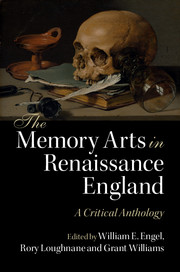Book contents
- Frontmatter
- Dedication
- Contents
- List of figures
- Acknowledgements
- A note on abbreviations
- Introduction
- PART I The art of memory
- Introduction to Part I
- I.1 Stephen Hawes, The Pastime of Pleasure (1509)
- I.2 [Laurence Andrewe], The Mirror of the World (1527)
- I.3 Peter of Ravenna, The Phoenix (1548)
- I.4 Guglielmo Gratarolo, The Castle of Memory (1562)
- I.5 Hugh Plat, The Jewel House of Art and Nature (1594)
- I.6 William Basse, A Help to Memory and Discourse (1620)
- I.7 John Willis, The Art of Memory (1621, 1661)
- I.8 Henry Herdson, Ars memoriae; the Art of Memory Made Plain (1651)
- I.9 Richard Saunders, Art of Memory (1671)
- I.10 Marius D'Assigny, The Art of Memory (1697)
- PART II Rhetoric and poetics
- PART III Education and science
- PART IV History and philosophy
- PART V Religion and devotion
- PART VI Literature
- Index
- References
I.6 - William Basse, A Help to Memory and Discourse (1620)
from PART I - The art of memory
Published online by Cambridge University Press: 05 August 2016
- Frontmatter
- Dedication
- Contents
- List of figures
- Acknowledgements
- A note on abbreviations
- Introduction
- PART I The art of memory
- Introduction to Part I
- I.1 Stephen Hawes, The Pastime of Pleasure (1509)
- I.2 [Laurence Andrewe], The Mirror of the World (1527)
- I.3 Peter of Ravenna, The Phoenix (1548)
- I.4 Guglielmo Gratarolo, The Castle of Memory (1562)
- I.5 Hugh Plat, The Jewel House of Art and Nature (1594)
- I.6 William Basse, A Help to Memory and Discourse (1620)
- I.7 John Willis, The Art of Memory (1621, 1661)
- I.8 Henry Herdson, Ars memoriae; the Art of Memory Made Plain (1651)
- I.9 Richard Saunders, Art of Memory (1671)
- I.10 Marius D'Assigny, The Art of Memory (1697)
- PART II Rhetoric and poetics
- PART III Education and science
- PART IV History and philosophy
- PART V Religion and devotion
- PART VI Literature
- Index
- References
Summary
About the author
William Basse (c. 1583–1653?), a household poet laureate to Sir Richard Wenman, may have been the text's author. Scholars are uncomfortable with the attribution, which originates from the initials W.B. on the title page of the companion miscellany A Help to Discourse (1619) and some of the miscellany's poetry.
About the text
Through its subtitle, A Help to Memory and Discourse (1620) identifies itself as a companion to W.B.'s Help to Discourse or A Miscellany of Merriment (1619). This 1619 volume is in turn indebted to W.B.'s Philosopher's Banquet (1609), a translation of Michael Scot's Latin work, Mensa Philosophica (Frankfurt, 1602). A Help to Memory and Discourse capitalised on the growing phenomenon of print collections, compendia and anthologies, which gathered together exempla, bon mots, wise counsels, ribald jests, religious controversies and curious riddles. The genre of the miscellany of wit armed young ambitious gentlemen with the conversational material necessary for competing in homosocial environments that fostered aggressive verbal display. The genre's popularity can be gauged by the seventeen editions of A Help to Discourse produced in the seventeenth century. A Help to Memory and Discourse strays liberally from the bounds of a proper commonplace book since it relies on a haphazard question-and-answer format with a welter of prose and verse rather than headings or even distinct thematic groupings.
The arts of memory
In the volume's prefatory section, the author makes a case for the essential interdependence between profitable conversation and effective retention and then proffers several aids to strengthen remembrance. The excerpt, cut from this preface, clearly demonstrates that the art of memory could assist gentlemen with recalling witty discourse and suggests that this art even hovered behind the period's popular print miscellanies. Although, after Erasmus's famous advice, print and manuscript techniques were often seen as desirable replacements for the art of memory, the author reminds us that writing and the place system were not at all mutually exclusive.
Textual notes
A Helpe to memory and discourse, the two syrens of the eare and ioynt twins of mans perfection (London, 1620), B2v–B6r.
A Help to Memory and Discourse
Q. Since discourse is so excellent, precious and profitable, and yet so few can orderly manage it, wherein consisteth the greatest help thereunto?
- Type
- Chapter
- Information
- The Memory Arts in Renaissance EnglandA Critical Anthology, pp. 69 - 73Publisher: Cambridge University PressPrint publication year: 2016



